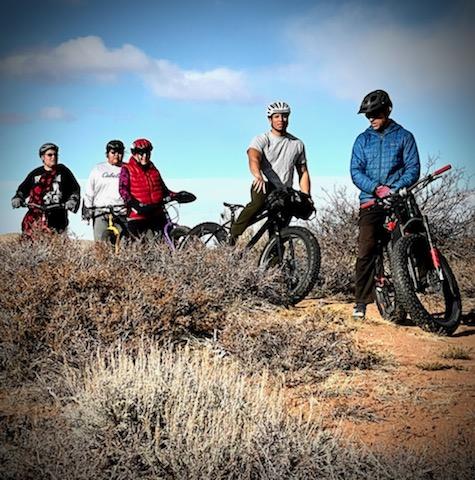Home / Photo Gallery / 2020 / BIKES Provides an outdoor experience and research for students
BIKES Provides an outdoor experience and research for students
Home / Photo Gallery / 2020 / BIKES Provides an outdoor experience and research for students
BIKES Provides an outdoor experience and research for students

What has a couple of dozen wheels, is about a thousand miles long, breathes air, and sleeps in the backcountry in snow and rain?
The answer is BIKES, Broadening Inclusion Knowledge and Experience in Science, a CWC Alpine Science Institute (ASI) project overseen by Jacki Klancher, Darran Wells, and Stacy Wells.
Klancher is the director of instruction and research at Central Wyoming College’s Alpine Science Institute and is accompanied in this effort by two of her faculty and cycling colleagues, both coaches for the International Mountain Bike Association (IMBA). Collectively this team wanted to design a project to increase diversity in STEM – science technology, engineering and math, while also introducing students to the thrill of ultradistance cycling. From their imaginations was born BIKES, and the concept of taking nine students (some who are brand new to cycling) training them intensively, then having them ride bikes a thousand off-road miles along the Great Divide while taking air samples and testing environmental quality. The idea has now progressed into a full academic and adventure cycling program and this team plans to conduct air quality data collection on their travels from Roosville, Montana to Lander, Wyoming.
BIKES is an extension of Darran and Stacy Well’s love of cycling, and from Klancher’s experiences riding her bicycle more than 2,700 miles from Banff, Alberta to the Mexican border in 2017 and 2018 on the same route the BIKES team will now follow. In 2017, Klancher fell short of completing the course by only a couple hundred miles before falling ill. She came back with renewed fervor the following year, finishing competitively in less than a month of continuous pedaling.
Klancher has previously taken students to Tanzania to conduct scientific investigations up to the apex of Mount Kilimanjaro, worked in partnership with colleague Todd Guenther to track reintroduced wolf packs in Yellowstone, ridden bikes with students on the Continental Divide in February to develop student-led environmental research projects, and supported student environmental education programs on the Wind River Reservation. Klancher, Guenther and Darran Wells also partner on the well-established Interdisciplinary Climate Change Expedition (ICCE). ICCE is a USFS partnered project which includes annual backcountry travel of 60 or more miles annually to Dinwoody Glacier to measure the effects of climate change on alpine glacial ice and to piece together the puzzle of prehistoric land use and the relationship between humans and alpine glaciers.
The BIKES expedition will leave Lander on June 7, and the team will drive to Roosville, Montana, on the Canadian border and will begin their southward trek on June 9, ending in Lander, after traveling about a thousand miles on unpaved primitive tracks. They hope to average 30-40 miles a day and will collect air quality data all along the route.
The team began meeting biweekly last October, planning the trek and designing the scientific program that is an integral part of the venture. In April, the group will participate in a couple of two-day training trips, with a four-day warmup in May. The riders will load their mountain bikes with bags containing day and overnight gear, much of which was furnished by the CWC Foundation. Additional funding for the student academic support has come from the Colorado-Wyoming Alliance for Minorities Program (COWYAMP), the Wyoming NASA Space Grant Consortium, and Wyoming Idea Networks of Biomedical Research Excellence (INBRE), an arm of the National Institutes of Health. Students will also be submitting proposals to Wyoming Established Program to Stimulate Competitive Research (EPSCoR) in hopes of gaining additional funding to support their field research. A significant amount of local business support and assistance has come from Gannett Peak Sports and Wild Iris Mountain Sports in Lander.
The participants are a diverse group of CWC students, with the riders/researchers including Jada Antelope, Tammy Green, Aidan Hereford, Will Joca, Tara Jorgenson, Alex Minge, Ryan Towne, and Madi Worthy. Visiting audiographer and podcast producer Marcella Fernandez will bike with the team and help to document the adventure. Most of the BIKES students are enrolled in CWC expedition science, GIS, or outdoor education programs. CWC students Gigi Holley and Keppy LaClair will provide logistical support, CWC faculty Stacy and Darran Wells are the field ride and road guides and are assisted by Ryan Towne, who will also serve as science coordinator. Kyle Nicholoff, Wyoming PBS videographer and senior producer, will capture the project in a documentary film. Klancher is the project coordinator.
The Alpine Science Institute at CWC is quickly making a name for itself far beyond the confines of Fremont County with its innovative contributions to environmental science, outdoor education, and archaeological discoveries. Consistent additional support of the ASI’s BIKES program is ongoing from Rory Tendore, American Indian student services coordinator at CWC and Dr. Tarissa Spoonhunter, professor of American Indian studies. Several American Indian students are participating in BIKES and other ASI expeditions and are making significant contributions to the success of the program.
For additional information, or to provide material or financial support for the BIKES expedition, contact Jacki Klancher, at the CWC Alpine Science Institute in Lander, jklanche@cwc.edu or (307) 240-7450.
2660 Peck Avenue
Riverton, WY 82501
(307) 855 – 2000
Campus Map
120 Enterprise Blvd.
Lander, WY 82520
(307) 332 – 3394
Campus Map
240 S. Glenwood St #124
P.O. Box 4795
Jackson, WY 83001
(307) 733 – 7425
Campus Map
302 W. Ramshorn
P.O. Box 175
Dubois, WY 82513
(307) 455 – 2625
Campus Map
© 2024 Central Wyoming College – All Rights Reserved